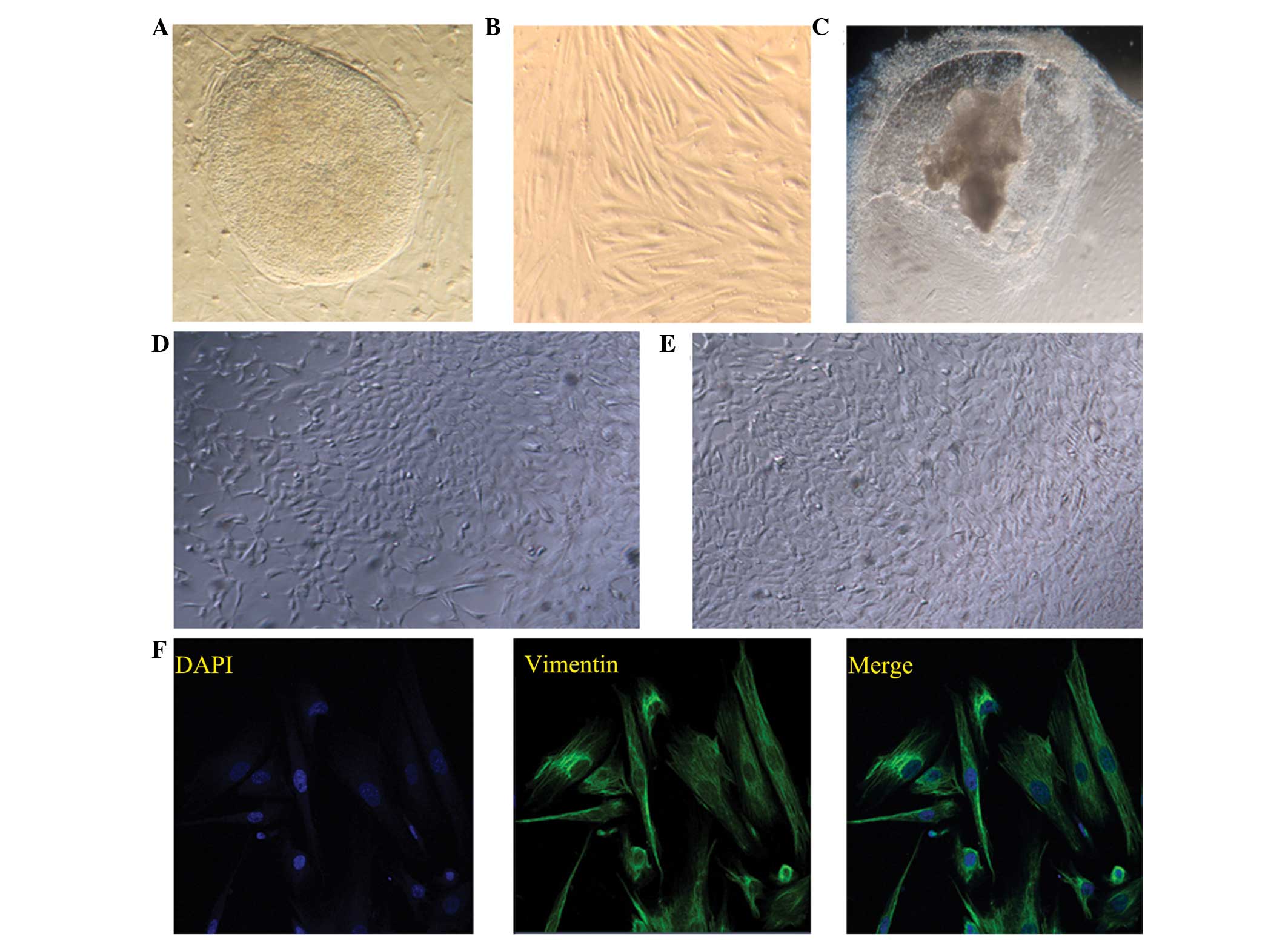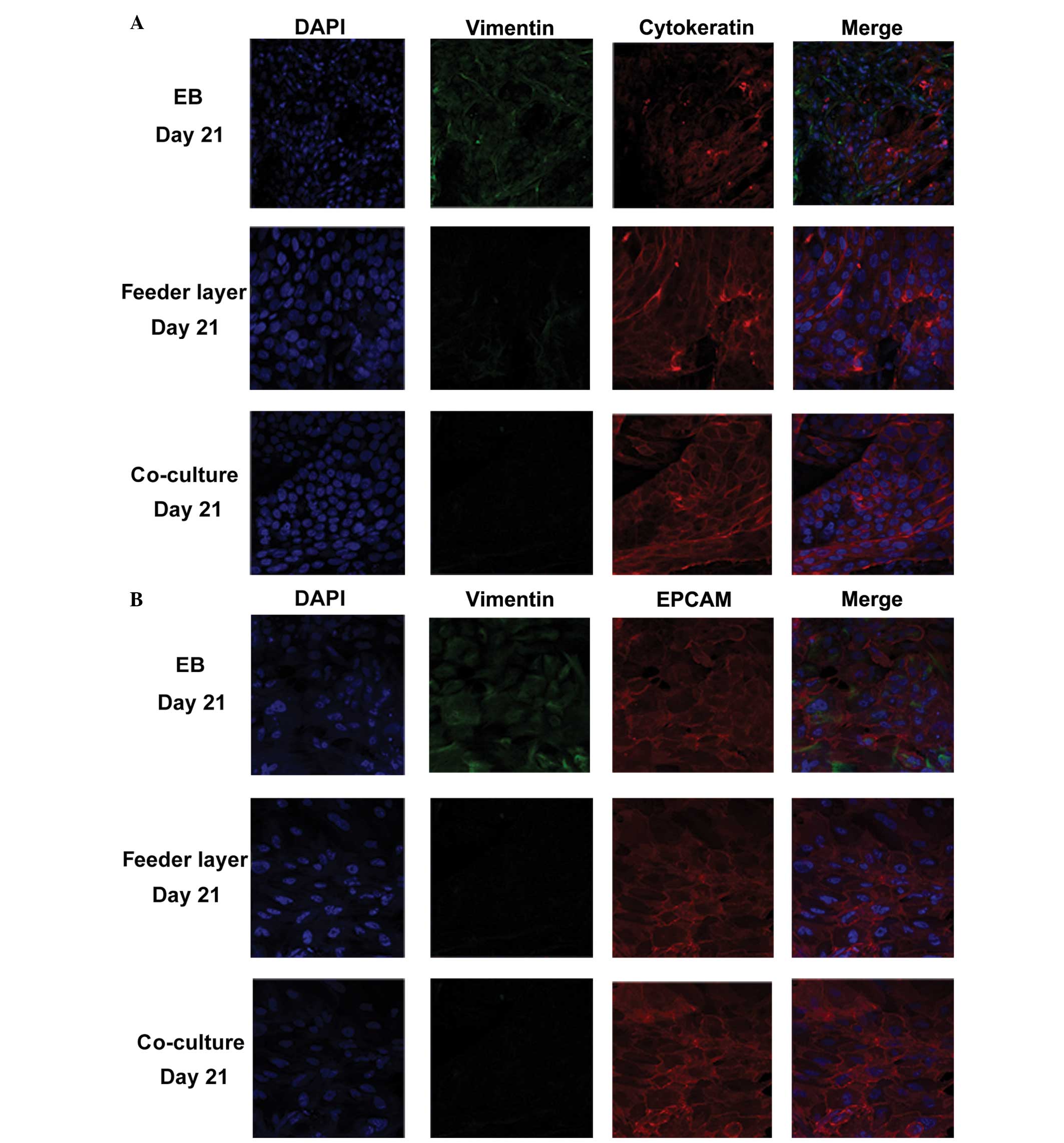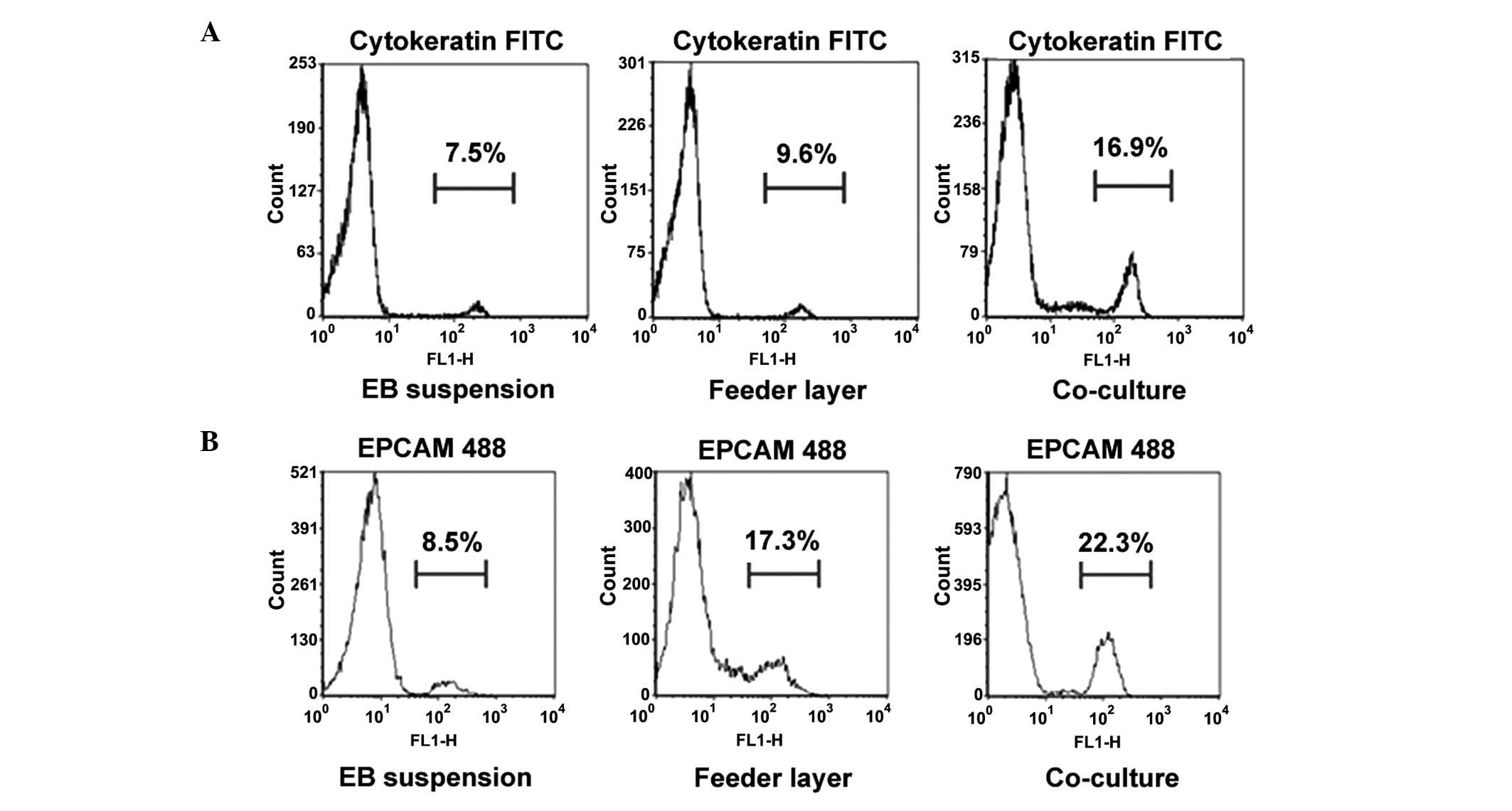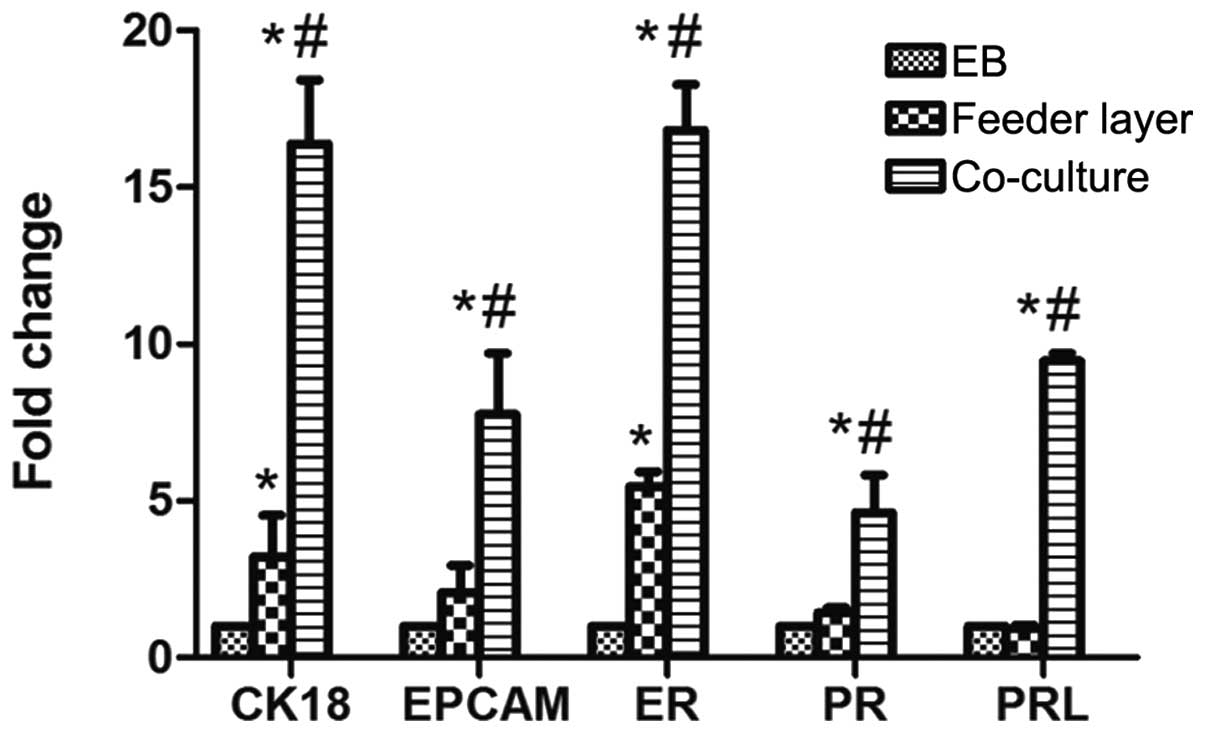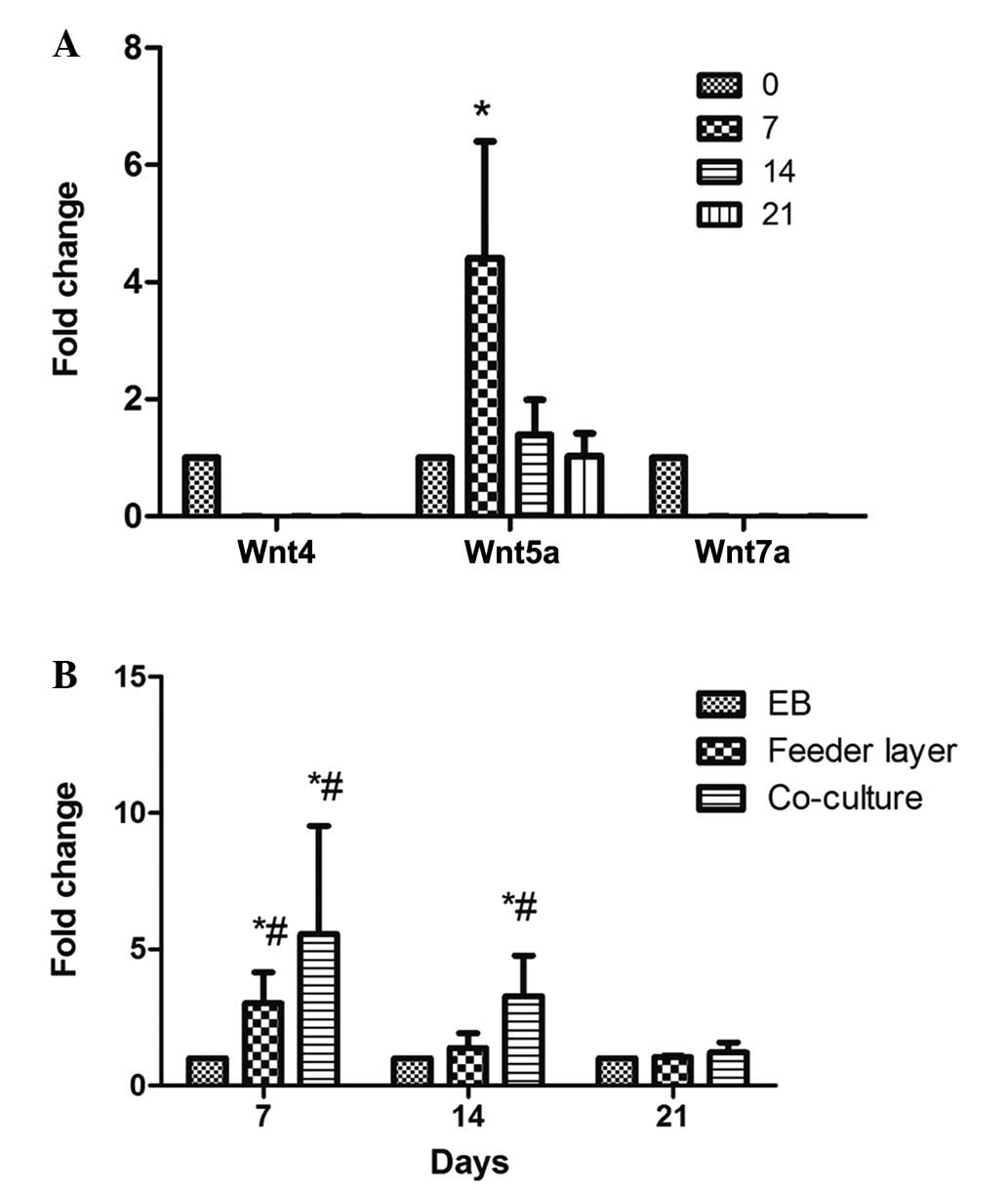|
1
|
Thomson JA, Itskovitz-Eldor J, Shapiro SS,
et al: Embryonic stem cell lines derived from human blastocysts.
Science. 282:1145–1147. 1998. View Article : Google Scholar : PubMed/NCBI
|
|
2
|
Hu Q and Rosenfeld MG: Epigenetic
regulation of human embryonic stem cells. Front Genet. 3:2382012.
View Article : Google Scholar : PubMed/NCBI
|
|
3
|
Gill KP, Hewitt AW, Davidson KC, et al:
Methods of retinal ganglion cell differentiation from pluripotent
stem cells. Transl Vis Sci Technol. 3:72014. View Article : Google Scholar : PubMed/NCBI
|
|
4
|
Lee JE and Lee DR: Human embryonic stem
cells: Derivation, maintenance and cryopreservation. Int J Stem
Cells. 4:9–17. 2011. View Article : Google Scholar : PubMed/NCBI
|
|
5
|
Unger C, Skottman H, Blomberg P, Dilber MS
and Hovatta O: Good manufacturing practice and clinical-grade human
embryonic stem cell lines. Hum Mol Genet. 17:R48–R53. 2008.
View Article : Google Scholar : PubMed/NCBI
|
|
6
|
Mountford JC: Human embryonic stem cells:
Origins, characteristics and potential for regenerative therapy.
Transfus Med. 18:1–12. 2008. View Article : Google Scholar : PubMed/NCBI
|
|
7
|
Du H and Taylor HS: Contribution of bone
marrow-derived stem cells to endometrium and endometriosis. Stem
Cells. 25:2082–2086. 2007. View Article : Google Scholar : PubMed/NCBI
|
|
8
|
Cai L, Ye Z, Zhou BY, Mali P, Zhou C and
Cheng L: Promoting human embryonic stem cell renewal or
differentiation by modulating Wnt signal and culture conditions.
Cell Res. 17:62–72. 2007. View Article : Google Scholar : PubMed/NCBI
|
|
9
|
Brafman DA, Phung C, Kumar N and Willert
K: Regulation of endodermal differentiation of human embryonic stem
cells through integrin-ECM interactions. Cell Death Differ.
20:369–381. 2013. View Article : Google Scholar : PubMed/NCBI
|
|
10
|
Tran NT, Trinh QM, Lee GM and Han YM:
Efficient differentiation of human pluripotent stem cells into
mesenchymal stem cells by modulating intracellular signaling
pathways in a feeder/serum-free system. Stem Cells Dev.
21:1165–1175. 2012. View Article : Google Scholar : PubMed/NCBI
|
|
11
|
Brafman DA, Chang CW, Fernandez A, Willert
K, Varghese S and Chien S: Long-term human pluripotent stem cell
self-renewal on synthetic polymer surfaces. Biomaterials.
31:9135–9144. 2010. View Article : Google Scholar : PubMed/NCBI
|
|
12
|
Jin S, Yao H, Krisanarungson P, Haukas A
and Ye K: Porous membrane substrates offer better niches to enhance
the Wnt signaling and promote human embryonic stem cell growth and
differentiation. Tissue Eng Part A. 18:1419–1430. 2012. View Article : Google Scholar : PubMed/NCBI
|
|
13
|
Atkinson SP, Lako M and Armstrong L:
Potential for pharmacological manipulation of human embryonic stem
cells. Br J Pharmacol. 169:269–289. 2013. View Article : Google Scholar : PubMed/NCBI
|
|
14
|
Dravid G, Ye Z, Hammond H, et al: Defining
the role of Wnt/beta-catenin signaling in the survival,
proliferation and self-renewal of human embryonic stem cells. Stem
Cells. 23:1489–1501. 2005. View Article : Google Scholar : PubMed/NCBI
|
|
15
|
Pyle AD, Lock LF and Donovan PJ:
Neurotrophins mediate human embryonic stem cell survival. Nat
Biotechnol. 24:344–350. 2006. View
Article : Google Scholar : PubMed/NCBI
|
|
16
|
Hayashi K and Spencer TE: WNT pathways in
the neonatal ovine uterus: potential specification of endometrial
gland morphogenesis by SFRP2. Biol Reprod. 74:721–733. 2006.
View Article : Google Scholar : PubMed/NCBI
|
|
17
|
Pellegrino M, Maiorino R and Schonauer S:
WNT4 signaling in female gonadal development. Endocr Metab Immune
Disord Drug Targets. 10:168–174. 2010. View Article : Google Scholar : PubMed/NCBI
|
|
18
|
Hayashi K, Yoshioka S, Reardon SN, et al:
WNTs in the neonatal mouse uterus: Potential regulation of
endometrial gland development. Biol Reprod. 84:308–319. 2011.
View Article : Google Scholar : PubMed/NCBI
|
|
19
|
Malayer JR and Woods VM: Expression of
estrogen receptor and maintenance of hormone-responsive phenotype
in bovine fetal uterine cells. Domest Anim Endocrinol. 15:141–154.
1998. View Article : Google Scholar : PubMed/NCBI
|
|
20
|
Thomson JA, Itskovitz-Eldor J, Shapiro SS,
et al: Embryonic stem cell lines derived from human blastocysts.
Science. 282:1145–1147. 1998. View Article : Google Scholar : PubMed/NCBI
|
|
21
|
Chen XM, Kan QC, Wang F, et al: Chromosome
dynamic changes in two cultured Chinese human embryonic stem cell
lines: Single nucleotide polymorphism, copy number variation and
loss of heterozygosity. J Cell Biochem. 113:3520–3527. 2012.
View Article : Google Scholar : PubMed/NCBI
|
|
22
|
Heikkila M, Peltoketo H and Vainio S: Wnts
and the female reproductive system. J Exp Zool. 290:616–623. 2001.
View Article : Google Scholar : PubMed/NCBI
|
|
23
|
Xie CQ, Lin G, Luo KL, et al: Newly
expressed proteins of mouse embryonic fibroblasts irradiated to be
inactive. Biochem Biophys Res Commun. 315:581–588. 2004. View Article : Google Scholar : PubMed/NCBI
|
|
24
|
Sarkar P, Randall SM, Muddiman DC and Rao
BM: Targeted proteomics of the secretory pathway reveals the
secretome of mouse embryonic fibroblasts and human embryonic stem
cells. Mol Cell Proteomics. 11:1829–1839. 2012. View Article : Google Scholar : PubMed/NCBI
|
|
25
|
Liu Y, Fox V, Lei Y, Hu B, Joo KI and Wang
P: Synthetic niches for differentiation of human embryonic stem
cells bypassing embryoid body formation. J Biomed Mater Res B Appl
Biomater. 102:1101–1112. 2014. View Article : Google Scholar : PubMed/NCBI
|
|
26
|
Amirpour N, Nasr-Esfahani MH, Esfandiari
E, Razavi S and Karamali F: Comparing three methods of co-culture
of retinal pigment epithelium with progenitor cells derived human
embryonic stem cells. Int J Prev Med. 4:1243–1250. 2013.PubMed/NCBI
|
|
27
|
Udayashankar R, Baker D, Tuckerman E,
Laird S, Li TC and Moore HD: Characterization of invasive
trophoblasts generated from human embryonic stem cells. Hum Reprod.
26:398–406. 2011. View Article : Google Scholar : PubMed/NCBI
|
|
28
|
Murdoch AD, Grady LM, Ablett MP, Katopodi
T, Meadows RS and Hardingham TE: Chondrogenic differentiation of
human bone marrow stem cells in Transwell cultures: Generation of
scaffold-free cartilage. Stem Cells. 25:2786–2796. 2007. View Article : Google Scholar : PubMed/NCBI
|
|
29
|
Yang Y, Li J, Pan X, et al: Co-culture
with mesenchymal stem cells enhances metabolic functions of liver
cells in bioartificial liver system. Biotechnol Bioeng.
110:958–968. 2013. View Article : Google Scholar : PubMed/NCBI
|
|
30
|
Yi F, Pereira L and Merrill BJ: Tcf3
functions as a steady-state limiter of transcriptional programs of
mouse embryonic stem cell self-renewal. Stem Cells. 26:1951–1960.
2008. View Article : Google Scholar : PubMed/NCBI
|
|
31
|
Clevers H: Wnt/beta-catenin signaling in
development and disease. Cell. 127:469–480. 2006. View Article : Google Scholar : PubMed/NCBI
|
|
32
|
van Amerongen R and Nusse R: Towards an
integrated view of Wnt signaling in development. Development.
136:3205–3214. 2009. View Article : Google Scholar : PubMed/NCBI
|
|
33
|
Angers S and Moon RT: Proximal events in
Wnt signal transduction. Nat Rev Mol Cell Biol. 10:468–477.
2009.PubMed/NCBI
|















